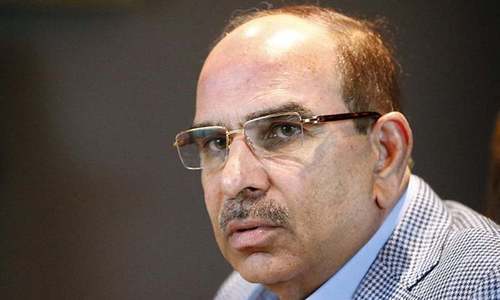ISLAMABAD: The Supreme Court on Tuesday wondered why former chief minister Pervaiz Elahi attended to a matter pertaining to demarcation of forest land in Takht Pari, Rawalpindi, only for his personal advantage that too by abusing his authority.
“Is it not a fit case for a reference on corruption?” wondered Justice Asif Saeed Khosa, one of the members of a five-judge SC bench.
The bench, headed by Chief Justice Mian Saqib Nisar, had taken up a review petition moved by Bahria Town (Pvt) Ltd against the May 4 SC verdict in which the court had held that Takht Pari, located six kilometres from Rawalpindi near G.T. Road, encompassed 2,210 acres, and not 1,741 acres.
Therefore, the judgement held, the exchange of land purportedly encroached upon by Bahria Town and the Punjab forest department as well as the attestation of mutations were based on erroneous assumption about the area.
Justice Khosa wonders if it isn’t a fit case for graft reference
The five-judge bench, however, postponed further proceedings to Dec 3 with a directive for the authorities to furnish complete revenue record of the area.
“Is it not quid pro quo that by ordering a fresh demarcation of the forest land, a large chunk of 270 kanals went to the former chief minister’s family members — Chaudhry Salik Elahi, Chaudhry Munir and Aaliya Shujaat? Is it not too much of a coincidence and what conclusion one should draw from it?” Justice Ijaz-ul-Ahsan asked.
He wondered when the apex court through its May 4 judgement had given an exhaustive finding, “how can we review the same. What business of approving for demarcation of the forest land has to do with the chief minister who has no role in the entire hierarchy of revenue department?”
The chief justice observed that the court could issue notices to the former Punjab chief minister and the forest department that generated the summary for approval by the chief minister under the dictated and forced command. He wondered under what authority of the law, the chief minister had approved the demarcation exercise.
Justice Khosa observed that the court could not accept the argument that though 10,000 trees were chopped off in the forest, the entire jungle was converted into a luxurious city. The land was first demarcated and then development started, he said, adding that he was surprised to learn that the people involved in the matter were roaming around freely when police instantly jailed a person accused of encroaching upon only one kanal of land.
“No one should be discriminated but all should be treated equally,” Justice Khosa said, adding that maybe the chief minister was not only the head of the provincial government but also the head of the family. “The entire structure [the way things were managed] stinks,” he regretted.
“The chief minister is bound to protect the public property as well as public trust,” the chief justice observed and said the court would not allow even a single inch of land to be encroached upon.
Senior counsel Aitzaz Ahsan, representing Bahria Town, argued that the dispute arose between his client and the forest department in 2005 as both were engaged in the demarcation of the forest land in which it was established that the land in the domain of the forest department was 1,741 acres, and not 2,210 acres.
This conclusion was supported by the revenue record and Bahria Town also paid proper compensation for acquiring the land. Thus the basic assumption on the basis of which the Supreme Court judgement came that the forest land consisted of 2,210 acres was wrong, he said, adding that it was the Board of Revenue which had moved the summary for approval of the demarcation.
When Mr Ahsan was advancing his arguments, Malik Riaz, chairman of Bahria Town, approached the rostrum to seek an audience. But the chief justice admonished him by stating that to the court he was just an ordinary litigant and nothing more and such interferences were never tolerated and invited contempt of court notices.
Malik Riaz should change his counsel or he himself should advance arguments if he had no confidence in them, the chief justice observed.
Published in Dawn, November 14th, 2018














































